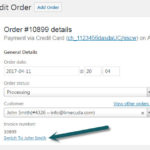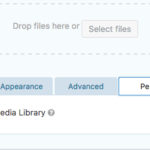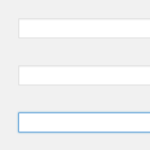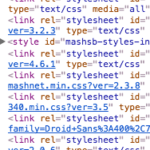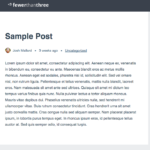Utilizing the theme.json file for customizing your WordPress site is a powerful way to enhance the user experience for those managing content within Gutenberg. We can access these settings within our custom gutenberg blocks by utilizing the “useSetting” function available within “@wordpress/block-editor”. Below is an example of how to utilize the color palette defined in […]
Updating A WordPress User Password – MySQL
When setting up new versions of live sites on your local machine, it’s easiest to migrate the entire database and dump it into your new install. We love using WP Migrate DB for this task. For local sites though, I like to have a very basic admin / password configured… Literally “admin” and “password”. In the […]
“Switch To User” Link on WooCommerce Order Details
The User Switching plugin is a great way to quickly see how Users at different access levels will interact with your site. It’s a necessary plugin for most development environments. (it also fits into our guidelines for extending WordPress for enterprise use) However, it can also be a great plugin for site admins working on […]
WordPress Conditional: “has_body_class()”
Was recently working on a new post layout for a site that we’re wanting to do some A/B testing for before shipping out the feature for the entire backlog of posts. Once we implement, there may be a few posts that keep the old layout which we’ll be controlling by giving those posts a certain […]
Using Gravity Forms Multi-File Uploads When Creating A New Post
Covered in this Tutorial Saving Gravity Forms File Uploads to the WordPress Media Library Attaching the Uploaded Media to a Post Created from the Submitted Gravity Form Connecting Gravity Forms Multi-File Upload Fields to ACF Gallery Field Saving Gravity Form File Uploads to the WordPress Media Library One of my favorite features in Gravity Forms is […]
Filter Genesis Post Info for Post Types Without an Author
Problem Genesis Post Info is the information about the post (post date, author, comments) that typically displays just below the title on your posts. If you have a Post Type that doesn’t support an “Author” for the post, the post info will display the “by” component followed by an empty block. Solution Check the current […]
Setting up Facebook Instant Articles for Your WordPress Site
Below are the steps used to setup your WordPress site with Facebook Instant Article. We’ll use the Instant Articles for Facebook plugin (version 3.1+). Your posts will then be enabled to appear on Facebook as Instant Articles. *It is best to have admin access to the Facebook page associated with your site before starting this […]
Force All set_url_scheme URLs to ‘https’
This was another fix that we needed to pursue when working with a site using a reverse proxy with WordPress. The problem occurs since the originating site for the reverse proxy cannot be secured with an SSL. The final site will be secured with an SSL but all the functions that use the “is_ssl()” conditional for generating […]
WordPress Reverse Proxy Conditional
We’ve got a WordPress project that is setup to run through a reverse proxy. With this setup, we constantly have situations where we need to check whether or not we’re accessing the site from its primary URL or via the reverse proxy. To do this, we set up a simple conditional to check the header for […]
Changing Custom Post Type Arguments
Many plugins register their own Custom Post Types (CPTs) for managing the content they’re adding to your site. However, there are times when you may want to change the default behavior of the post type. How do you change the arguments for creating the post type without manually changing the code in the plugin? Enter the […]
Make Yoast SEO’s Social Contact Methods Accessible on the Front-End of WordPress
The Yoast SEO plugin registers some helpful Social Media contact methods on a WordPress User Profile that are available for users to add information for Google+, Twitter, and Facebook. You can access the values set for each user on the front-end of your WordPress site using the get_the_author_meta() function. However, when creating an Author template in a […]
Include Additional Contact Methods on WordPress User Profiles
On your WordPress user profile, you’ll notice that WordPress includes “Contact Info” fields to store: Email Website Google+ Twitter & Facebook information However, you can filter those contact methods to also include any other contact methods that you’d like. For example, the snippet below is what we’re using on this site to also include links to […]
Engineering Standards from Big Names in WordPress
Are there WordPress Engineering Standards? Yes and no. While there are some excellent listing of standards for best engineering in WordPress, there is no single “official” engineering standard. WordPress is an open source community. This open nature is core to how many of us learn, work, and grow as developers. I love being able to […]
Workflow for Full Project Sprints with a Single Developer
This is what we’re using as a template to follow when working on full project sprints that have a single developer. The following sprint workflow is a work-in-progress. Setup in Github Create a new milestone for the sprint (ex. Sprint 104) First issue created for that milestone will be a “Sprint Success” issue. This will […]
Customizing Google AMP for WordPress – Styling your AMP Pages
Customizing Google AMP for WordPress Introduction Styling Your AMP Pages In the introduction to this series, we gave a brief overview about Google AMP as well as a couple of foundational customizations. If you haven’t checked out that post yet, I encourage you to head there first since the section on “Customizing Templates” […]
Customizing Google AMP for WordPress Introduction
Customizing Google AMP for WordPress Introduction Styling Your AMP Pages The idea behind Google AMP is pretty exciting. A new javascript library and specialized markup designed specifically for extremely fast performance of our web pages. Google will be rolling out these AMP links in their general search results so getting AMP for WordPress set up on our […]
My Struggles with WordPress srcset and the Thumbnail Image Size
Handling images for responsive design got a massive push with the release of WordPress 4.4 and the inclusion of the srcset attribute for images. For a general overview, the srcset attribute tells the browser about the different versions of the image available and lets it decide which one to download based on the current screen size. This means, you […]
Made with <3 by LimeCuda
It started as a joke. Looking at the footer of a site, I thought it would be funny to reach out to Blake on chat, “Why do so many sites feel the need to tell you that they were made by fewer than three people in a certain city?” What I thought was a funny […]
